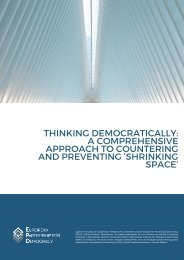Repression and resilience: Diagnosing closing space mid-pandemic
Create successful ePaper yourself
Turn your PDF publications into a flip-book with our unique Google optimized e-Paper software.
24 REPRESSION AND RESILIENCE: DIAGNOSING CLOSING SPACE MID-PANDEMIC<br />
Between February 2020 <strong>and</strong> March 2021, countries<br />
first started postponing elections en masse, with at<br />
least 78 countries <strong>and</strong> territories postponing elections<br />
due to COVID-19. However, after an initial wave of<br />
postponements, at least 113 countries <strong>and</strong> territories did<br />
hold elections in that period, including 52 elections that<br />
had initially been postponed. 81 While postponements<br />
are justified due to public health concerns, the way in<br />
which they were implemented in some countries often<br />
failed to meet democratic st<strong>and</strong>ards, either because the<br />
scheduling of new elections was delayed or because<br />
adequate preparations for safe <strong>and</strong> secure voting were<br />
never put in place. 82<br />
Burundi <strong>and</strong> Ug<strong>and</strong>a<br />
The vastly different approaches to the p<strong>and</strong>emic in the<br />
face of elections in Ug<strong>and</strong>a <strong>and</strong> Burundi sheds light on the<br />
way autocratic regimes have used COVID-19 as an excuse<br />
to consolidate their power through elections. In Ug<strong>and</strong>a,<br />
the measures justified by the p<strong>and</strong>emic were taken as an<br />
opportunity for repression by the government, whereas<br />
the Burundian government considered the p<strong>and</strong>emic a<br />
potential threat to its re-election <strong>and</strong> therefore largely<br />
ignored it.<br />
In Burundi, the pre-p<strong>and</strong>emic <strong>space</strong> for competition<br />
was already inaccessible, with high financial barriers for<br />
running in elections, the need for government permission<br />
to hold party meetings <strong>and</strong> a lack of real opposition<br />
parties. As elections were used to legitimise the continued<br />
rule of an authoritarian government, the ruling party<br />
<strong>and</strong> authorities decided to minimise the importance of<br />
the p<strong>and</strong>emic in their discourse <strong>and</strong> actions, to ensure<br />
they could hold elections <strong>and</strong> continue campaigning<br />
without obstacles. Eight days before the election took<br />
place, Burundian authorities expelled the top WHO<br />
representative in the country <strong>and</strong> three other experts<br />
coordinating the national coronavirus response. 83<br />
The only measures that were taken against the<br />
p<strong>and</strong>emic’s spread similarly served to promote unfair<br />
elections: African Union election observers were told<br />
upon arrival that they had to quarantine until after the<br />
elections were over. The Burundian diaspora, who are<br />
generally closer to opposition parties, was also unable<br />
to enter the country to vote - therefore disenfranchising<br />
12,933 voters registered abroad. 84 Only once a new<br />
President was elected did the country acknowledge the<br />
p<strong>and</strong>emic <strong>and</strong> start a new testing campaign as a way to<br />
gain legitimacy.<br />
In contrast, in Ug<strong>and</strong>a the p<strong>and</strong>emic was used as an<br />
excuse to hamper opposition parties’ activities while<br />
<strong>closing</strong> an eye to the ruling party’s campaigning activities.<br />
At a time when TV, radio <strong>and</strong> social media were the only<br />
channels of socially distant campaigning, the police<br />
threatened to shut down privately owned media stations<br />
if they provided access to any opposition c<strong>and</strong>idates.<br />
Opposition actors were denied access to meeting venues<br />
whilst campaign rallies for opposition c<strong>and</strong>idates were<br />
violently disrupted by the police, leading to thous<strong>and</strong>s<br />
of injuries, multitudes of arrests <strong>and</strong> several deaths at<br />
the h<strong>and</strong>s of the police. 85 In contrast, the ruling party had<br />
unrestricted access to the media <strong>and</strong> held undisrupted<br />
campaign rallies <strong>and</strong> meetings with dangerously large<br />
crowds. The selective application of campaigning rules<br />
a<strong>mid</strong> the p<strong>and</strong>emic tremendously hampered <strong>space</strong> for<br />
political competition, which was already minimal before<br />
the p<strong>and</strong>emic.<br />
81 International IDEA (2020-2021): Global overview of COVID-19 impact on elections. Consulted on 25 March 2021 <strong>and</strong> last updated on 21<br />
March 2021. Available here.<br />
82 Freedom House (2020): Democracy Under Lockdown: The Impact of COVID-19 on the Global Struggle for Freedom. Available here.<br />
83 Al Jazeera (14 May 2020): “Burundi expels WHO officials coordinating coronavirus response”. Available here.<br />
84 International Crisis Group (2020): “An Essential Primer on Burundi’s Elections”. Available here.<br />
85 Human Rights Watch (2021): Ug<strong>and</strong>a: Elections Marred by Violence. Available here.

















